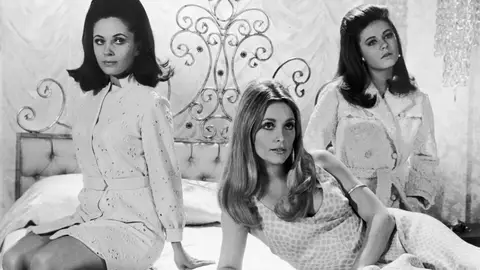Can We Talk About...? Once Upon a Time in the "Valley of the Dolls"

Can We Talk About...? is a weekly series that is technically vers but can still self-lubricate.
The murder of pregnant actress Sharon Tate and four others by followers of Charles Manson in 1969 shocked the nation and effectively put an end to the ethos of peace and free love espoused by the hippies in the latter half of the decade.
Tate, who was married to director Roman Polanski, has long been an iconic figure, embodying three of the most important qualities Hollywood loves in a legend: She was young, beautiful, and tragic. Quentin Tarantino mines this eternal fascination with the actress in his latest film, Once Upon a Time in Hollywood, featuring Aussie actress Margot Robbie as Tate.
In 1967, the 24-year-old scored her big cinematic breakthrough with the adaptation of the hit Jacqueline Susann novel Valley of the Dolls, about a trio of actresses who succumb to their addictions to pills—the titular "dolls." The book was a genuine phenomenon. Though it was lambasted by critics, at the time of Susann's death in 1974 it was the best-selling novel in history.
A film treatment was inevitable, and Tate was cast as one of the three main leads, alongside former child star Patty Duke and soap-opera actress Barbara Parkins. Tate played Jennifer North, a stunning but untalented actress prized solely for her body.
Duke, a child star who became the youngest person to win an Oscar (for 1962's The Miracle Worker), was desperate to transition to more adult roles. She really threw herself into playing Neely O'Hara, the talented ingénue who turns into a pill-popping, man-stealing, drunken mess of a monster.
You know—goals.
Parkins, who portrayed level-headed model Anne Welles, starred in the wildly popular prime-time soap Peyton Place. The 1957 film of the same name, based on the novel by Grace Metalious, was directed by Mark Robson. Having proved his faculty with melodrama, he was also tapped to helm Valley of the Dolls.
Neely O'Hara was in part based on Judy Garland. Little lady, big talent, bigger problems. In what would have been a delicious slice of stunt casting, Garland was set to play aging Broadway diva and Neely's archnemesis Helen Lawson. Notorious for the temperamental behavior Neely exhibits throughout Valley of the Dolls, Garland was reportedly fired from the production for showing up to work drunk. Classic Judy. But at least we got these screen tests before that ship sailed.
Duke, however, claims Robson purposely kept Garland waiting around all day, knowing full well she'd start dipping into the sauce.
"The studio hadn't even built the set yet, and the tabloids had me walking off it," Garland said of the bad press she received. Still, in true diva form, Garland kept her sequined pantsuit (and her salary!) from the film and wore it in concert. Hearing her rousing rendition of "I'll Plant My Own Tree," one can only wonder what could've been.
Garland was replaced by Susan Hayward, an Oscar winner for 1958's I Want to Live! (note the exclamation point—how could she not win an Oscar?). Though Hayward lip-synched the version of "I'll Plant My Own Tree" that made it into the film, she really sunk her teeth into the Helen Lawson role… and chewed every bit of scenery in her wake.
To be fair, Duke also overacted the house down. Duke and Hayward battling it out to see who can be more extra is one of the many reasons Valley of the Dolls remains the quintessential camp film.
If the background shenanigans weren't enough, the movie itself is a masterpiece of schlock. The acting is so over-the-top, the story lines so ridiculous, and the similarities to real-life celebrities so obvious (perhaps Judy reprimanding Neely about booze and dope would've been too on the nose) that what we're left with is a treasure trove of queer gems.
Neely and Helen are basically two drunk drag queens arguing over who has sex with the most gay men.
And that's a fight we all win.
There's even a wig snatch, for God's sake:
The movie implies that Neely's second husband, the dramatically named Ted Casablanca, is gay, so when she catches him in the pool with a stranger, Neely is quick to pull out the F-bomb.
But his underwater tryst was with a woman, even though the novel tells a different, far more salacious story:
Censorship restrictions at the time prevented some of the more colorful instances from the book making it into the film, such as Jennifer's experimentation with lesbianism, Ted Casablanca's homosexuality, and [Jennifer's husband] Tony's predilection for anal sex.
No wonder Valley of the Dolls is one of the best-selling books ever. Despite its efforts to tone down the gay, the film was a major box-office success—though, like the novel, it received terrible reviews.
Still, Tate was nominated in the now defunct "Most Promising Newcomer - Female" category at the Golden Globes, losing out to Katharine Ross in The Graduate. Sadly, Tate's film success was brief. Both she and Garland would die in the summer of 1969.
A bit prophetically, Jennifer, Tate's Valley of the Dolls character, dies young and beautiful, too, albeit under different circumstances. Jennifer endures a series of hardships and embarrassments in her life, leading her to commit suicide. After taking a bottle of dolls, she drifts off into death, her face gorgeously lit, preserved for eternity.
Upon Tate's death, Valley of the Dolls was rereleased. The 1970 "sequel," Beyond the Valley of the Dolls, co-penned by the late Roger Ebert, is perhaps an even bigger camp classic. There have been other incarnations of the original film over the years, including a 1981 miniseries and a late-night syndicated soap in 1994, but now it feels particularly ripe for a remake. An HBO miniseries, perhaps?
After all, Valley of the Dolls is basically Big Little Lies—with (slightly) more pills.





